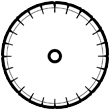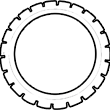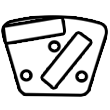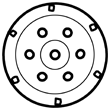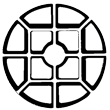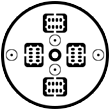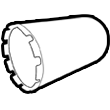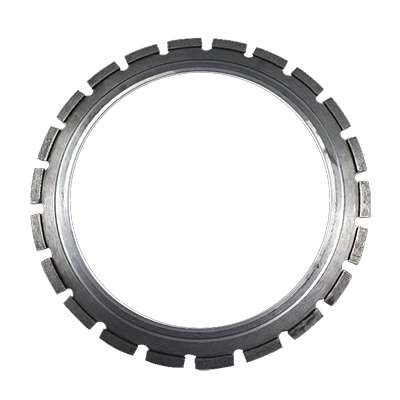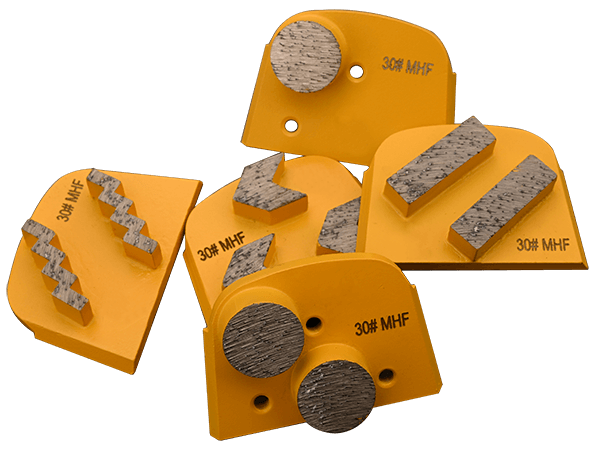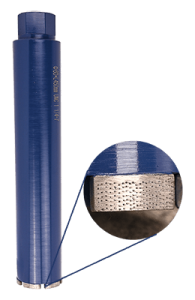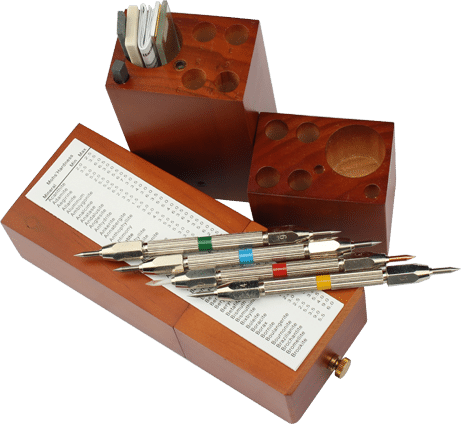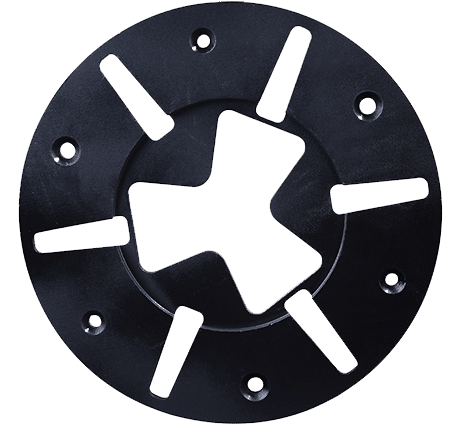Table of Contents
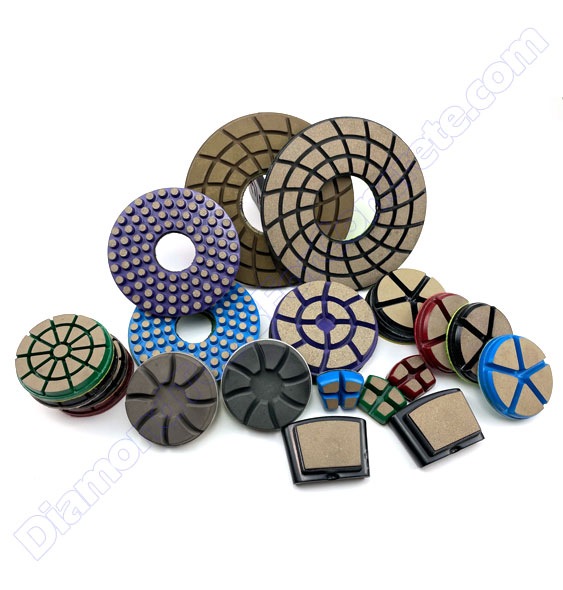
Diamond polishing pads can be categorized based on the material they are designed for: stone or concrete. Concrete polishing pads are generally thicker than those for stone due to the heavier demands of floor polishing. We offer concrete polishing pads with a maximum height of 15mm.
Concrete polishing pads can be used with either hand-held polishers or floor grinding machines. Hand-held machines are versatile and ideal for polishing concrete countertops or worktops, while floor grinding machines are suited for the more demanding task of large-scale floor polishing.
7 things you may need to know
When buying concrete polishing pads, there are seven things you may need to consider that will help you choose the most suitable pads for your specific project.
1. Bond types
The bond refers to the material that holds the diamond particles in place within the segment. This bond plays a crucial role in the performance and lifespan of the grinding segment, as well as its suitability for different materials and applications. The hardness of the bond is important. If the bond is too soft, it will wear down quickly when working on an abrasive material like concrete.
Concrete polishing pads come in various bond types, such as Resin bond, Copper bond, Hybrid bond, and Ceramic bond, each suited for different stages of the polishing process and specific applications. Nearly all wet polishing pads use a resin bond. Ceramic bonds typically withstand wear better and tolerate higher temperatures compared to resin pads. Many dry pads use ceramic binders, which help prevent smearing and glazing that can occur when resin-based dry pads are run at excessive speeds.
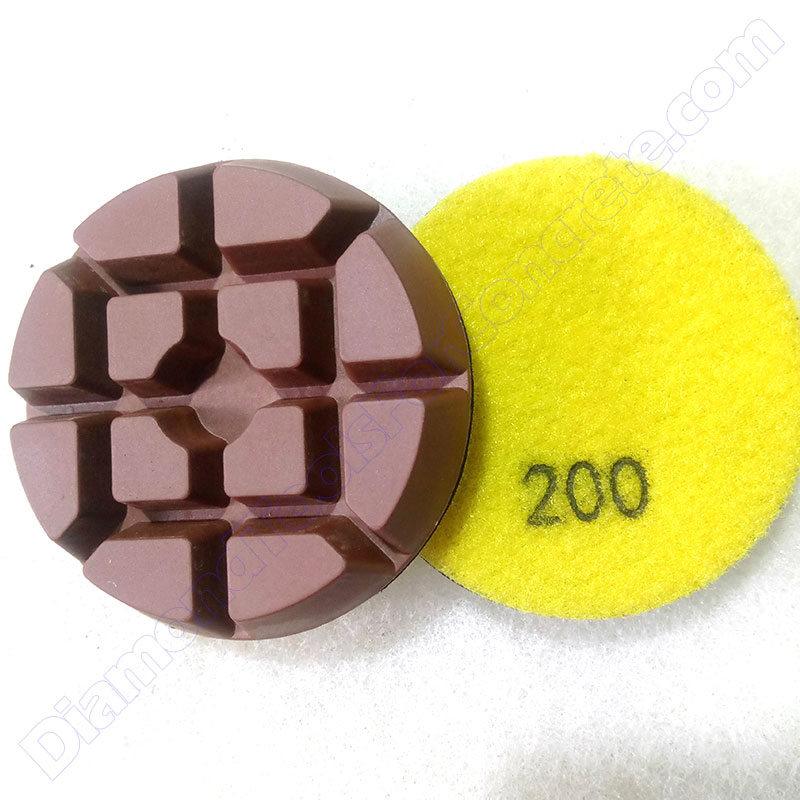
Copper/Hybrid Bond
Use: Intermediate stage between the metal bond and resin bond.
Features: Combines the aggressiveness of metal bond with the smoother finish of resin bond, used for transitioning from coarse grinding to fine polishing.
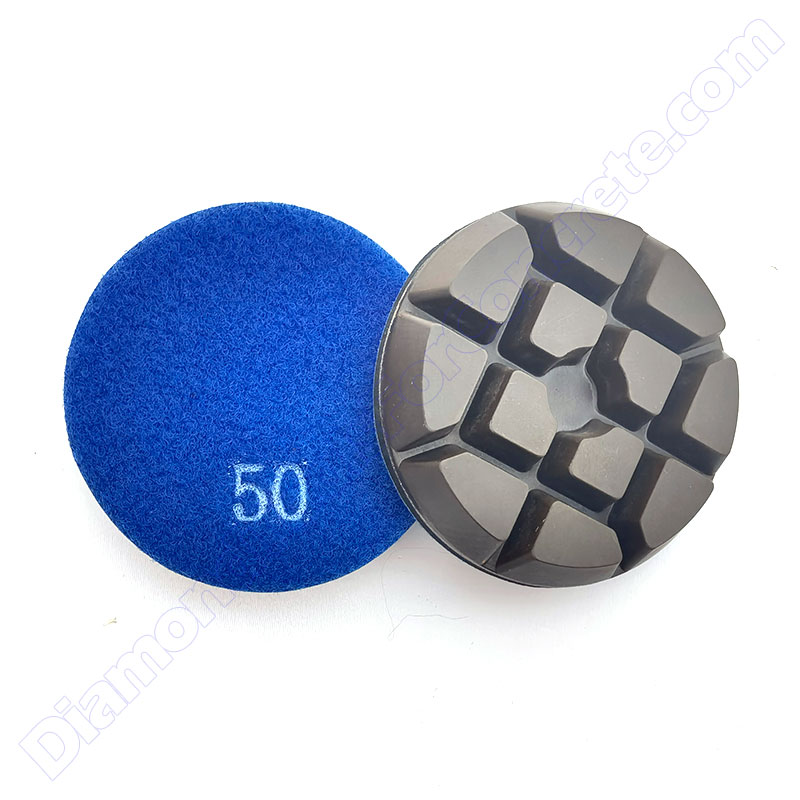
Resin Bond
Use: Used in the finer polishing stages.
Features: Provides a smoother finish and higher gloss, ideal for refining the surface and achieving the desired sheen.
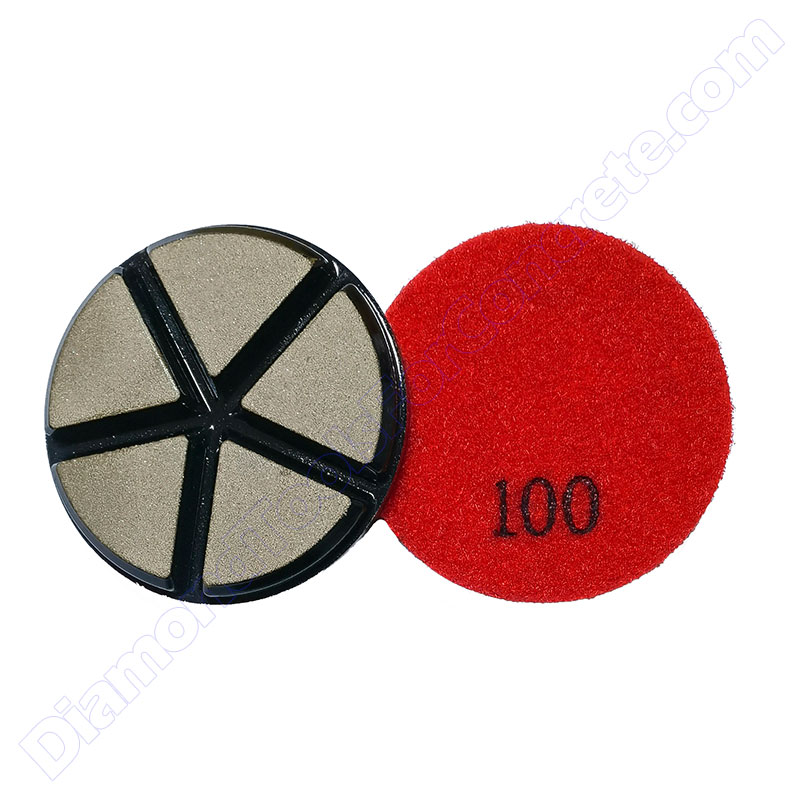
Ceramic Bond
Use: Often used in intermediate polishing stages.
Features: Offers a balance between cutting power and finishing, used to smooth out scratches left by metal bond pads.
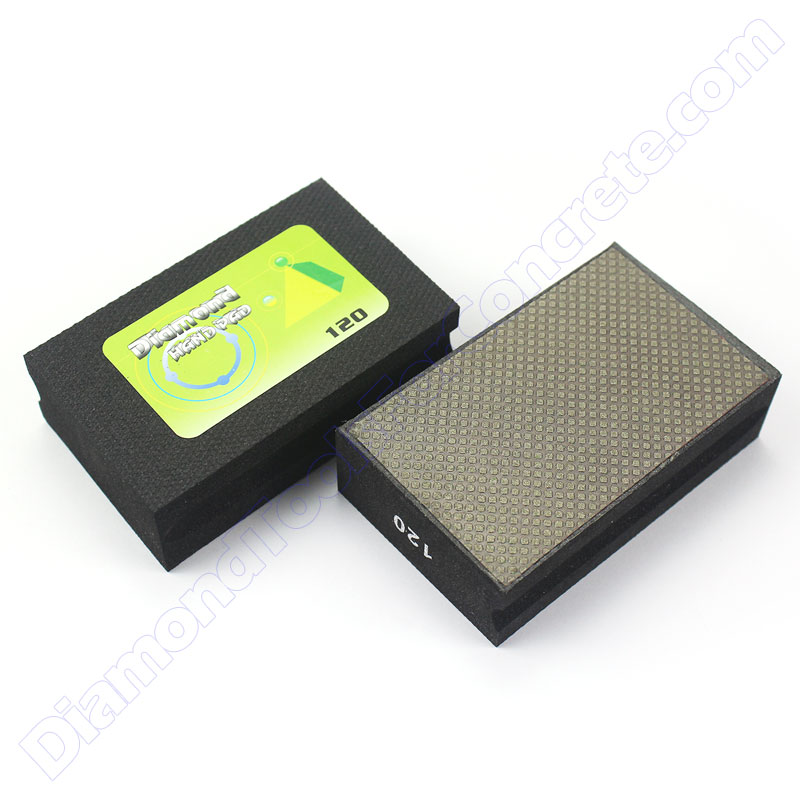
Electroplated
Use: Typically used for edge work or in specialty applications.
Features: Very aggressive and long-lasting, effective for detailed work on edges and corners..
2. Diameter
Concrete polishing pads come in common sizes such as 3″, 4″, 5″, and 7″, each suited for different applications.
When polishing concrete countertops:
- Larger 7″ pads are stable on large, flat areas, making them ideal for expansive surfaces, but they can be difficult to control on narrow sections or vertical edges.
- Smaller 3″ and 4″ pads excel in precision work, like edges and tight spaces, especially with smaller polishers, though they may be prone to gouging on larger surfaces.
- A 5″ pad offers a balanced option, providing good stability and control for a variety of tasks, making it a versatile choice for most polishing needs.
When polishing concrete floor:
3. Thickness
Diamond polishing pads come in various thicknesses, from around 2mm to 15mm, with concrete polishing pads generally being thicker than those for stones.
The thickness of the pad influences its application: thicker pads are more durable and long-lasting, making them suitable for use on floor grinders and polishers for concrete floors. Conversely, thinner pads, though less durable, offer greater flexibility, making them ideal for use on hand-held grinders and polishers for honing or polishing curved integral sinks or the edge of concrete countertops.
4. Diamond grits
Diamond polishing pads for concrete floors cover a grit range from 30 to 3,000 grit, each serving a distinct purpose in the polishing process. In most cases, 1500# grit is sufficient to achieve a smooth and satisfactory polished surface on concrete or terrazzo floors, while 3000# grit and buffing are typically reserved for stone polishing.
- Coarse Grits (30-100): These pads are essential for the initial grinding stage, where they aggressively remove significant surface imperfections, old coatings, and deep scratches. The 30-grit pads are highly abrasive for heavy-duty work, while 100-grit pads begin the process of smoothing the surface.
- Medium Grits (200-400): Following the coarse grinding, medium-grit pads are used for honing. They further refine the surface, eliminating any remaining scratches from the previous stage and preparing the surface for finer polishing. The 200-grit pads continue the smoothing process, and the 400-grit pads start to introduce a subtle sheen.
- Fine Grits (800-3,000): In the final polishing phase, fine-grit pads are used to achieve a high-gloss, mirror-like finish. The 800-grit pads initiate the polishing, while pads with grits between 1,500 and 3,000 further enhance the gloss and clarity, resulting in a highly reflective surface.
The specific sequence of grits used can vary based on the condition of the concrete and the desired final appearance, but this general progression helps ensure a professional and durable finish.
Buffing polishing pads for concrete floors are used in the final stage to achieve a high-gloss, mirror-like finish. Made from soft materials like felt, foam, or microfiber, these pads smooth out micro-scratches and enhance the concrete’s natural luster. Used with floor polishers or burnishers, they can be applied dry or with a polishing compound, delivering a premium, durable finish that enhances both the appearance and maintenance of the concrete floor.
5. Pattern
The patterns on concrete polishing pads significantly influence their performance and the finish they produce. Here are some key aspects:
- Cutting Efficiency: Pads with more aggressive patterns, such as larger or more pronounced segments, can cut more quickly and remove material more effectively. These patterns are ideal for initial grinding and removing surface imperfections.
- Cooling and Dust Removal: Patterns that feature grooves, channels, or open designs help with cooling and dust removal. These features allow water and debris to flow away from the contact area, reducing heat buildup and preventing clogging, which can enhance the pad’s lifespan and maintain consistent performance.
- Flexibility and Surface Contact: Pads with finer, closely spaced patterns offer better flexibility and surface contact, making them suitable for polishing curved or detailed surfaces. These patterns can distribute pressure more evenly, resulting in a more uniform finish.
- Finish Quality: The pattern also affects the final surface finish. More intricate or fine patterns can produce a smoother and more polished surface, while coarser patterns might leave a more textured finish, which might be desirable in some cases for slip resistance.
- Durability: The pattern design can also influence the durability of the pad. Patterns that distribute wear evenly across the pad can extend its lifespan, while those that focus wear on certain areas may reduce the pad’s effective life.
In summary, the choice of pattern on concrete polishing pads should align with the specific requirements of the project, including the desired finish, surface type, and the stage of polishing.
6. Three steps, and five steps
3-step and 5-step concrete polishing pads are designed to achieve different levels of finish on concrete surfaces, with the primary difference being the number of stages and the level of detail each system offers.
3-step pads streamline the process into three stages, making them quicker and more cost-effective. In contrast, 5-step pads offer a more gradual and detailed approach, with additional stages for finer control and a higher-quality finish. As a result, 5-step systems typically produce a more polished and reflective surface, though they require more time and investment compared to 3-step systems.
7. Wet or dry
Except for polishing pads specifically designed for dry use, all others should be used for wet polishing. Wet polishing offers several advantages: it cools the pads, enhances efficiency, controls dust, and extends pad lifespan. If dry polishing is necessary, choose pads made for dry use and ensure you have the appropriate dust control equipment.
The diamond formulas in wet and dry pads are distinct. Using wet polishing pads for dry applications can lead to overheating and potential burning of the segments, as they are not designed to withstand the high temperatures generated during dry polishing.
Concrete polishing pads
Xpert Diamond Tools offers a wide range of concrete polishing pads, from thin to thick, small to large, and in various bonds, including copper, resin, ceramic, and electroplated. We also provide both wet and dry polishing pads, as well as specialized polishing tools for specific floor grinders, such as resin and ceramic HTC floor polishing discs.
Resin concrete polishing pads
Resin concrete polishing pads are the most commonly used type for polishing concrete floors. We primarily offer 3-inch and 4-inch pads, with a thick design that ensures durability and a long lifespan. Various patterns are available to enhance performance and visual appeal. The pads are offered in a full range of diamond grits, including 50#, 100#, 200#, 400#, 800#, 1500#, 3000#, and buffing. High-quality, high-concentration industrial diamonds are used to guarantee superior performance.
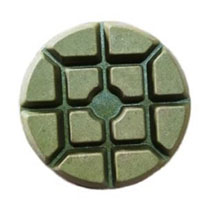
XFP01
3″, 4″
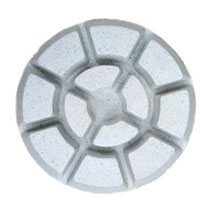
XFP02
3″, 4″
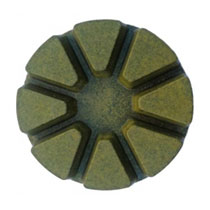
XFP03
3″, 4″
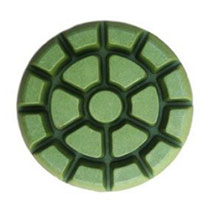
XFP04
3″
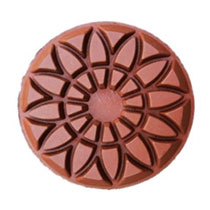
XFP05
3″
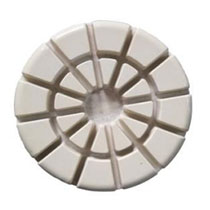
XFP06
3″
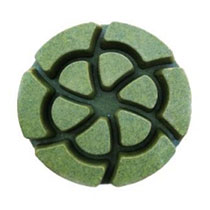
XFP07
3″
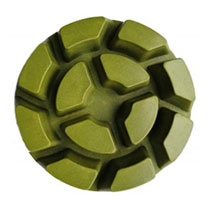
XFP08
3″
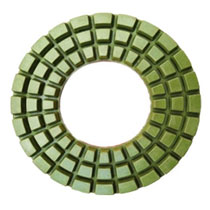
XFP09
9″
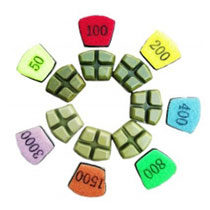
XFP10(werkmaster)
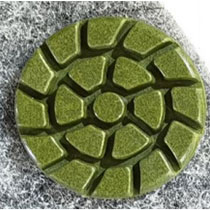
XFP11
3″
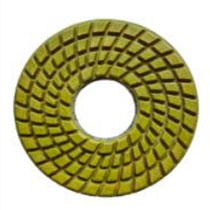
XFP12
10″
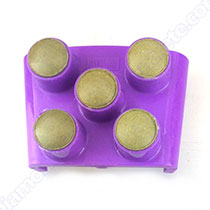
XFP13(HTC)
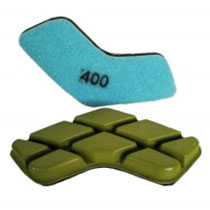
XFP14(Onfloor)
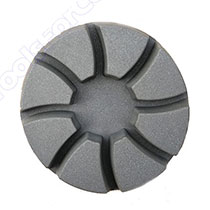
XFP15
3″
Copper/hybrid/transition concrete polishing pads
Copper polishing pads, often referred to as hybrid or transition polishing pads, are specialized tools designed to bridge the gap between the grinding and polishing phases of concrete surface preparation. These pads are engineered to provide an intermediate step that effectively removes scratches and imperfections left by metal bond grinding tools while preparing the surface for the finer polishing stages.
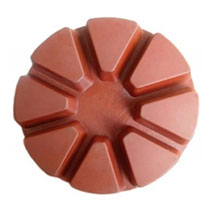
XCRP01
3″, 4″
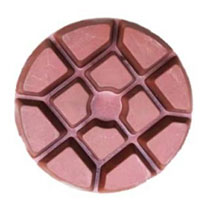
XCRP02
3″, 4″
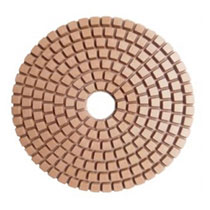
XCRP03
3″, 4″, 5″, 6″, 7″, 9″
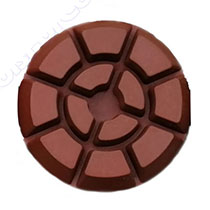
XCRP04
3″, 4″
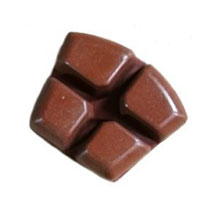
XCRP05
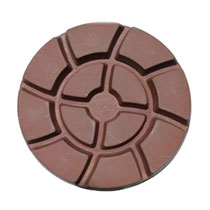
XCRP06
4″
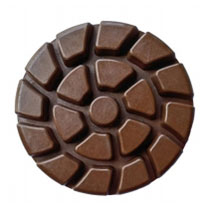
XCRP07
3″
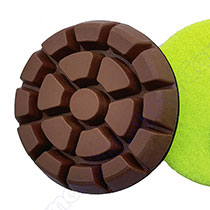
XCRP08
3″
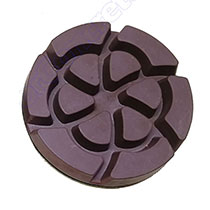
XCRP09
3″
Ceramic concrete polishing pads
Ceramic concrete polishing pads are an excellent choice for efficiently removing scratches from concrete surfaces, particularly after using metal resins. These pads are designed to deliver a smoother finish by quickly addressing surface imperfections. They are versatile and can be used either wet or dry, depending on your specific application needs.
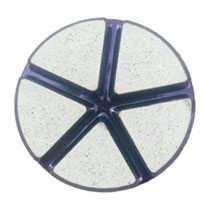
XCCP01
3″
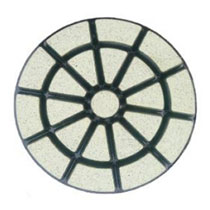
XCCP02
3″
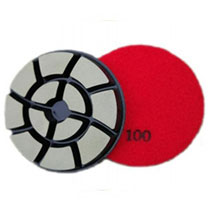
XCCP03
4″
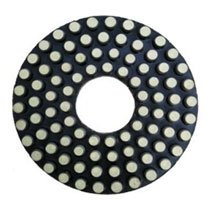
XCCP04
5″
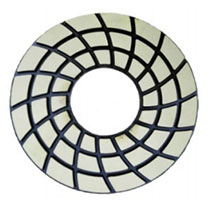
XCCP05
7″
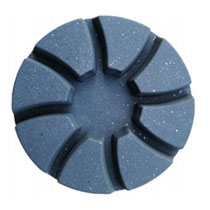
XCCP06
3″
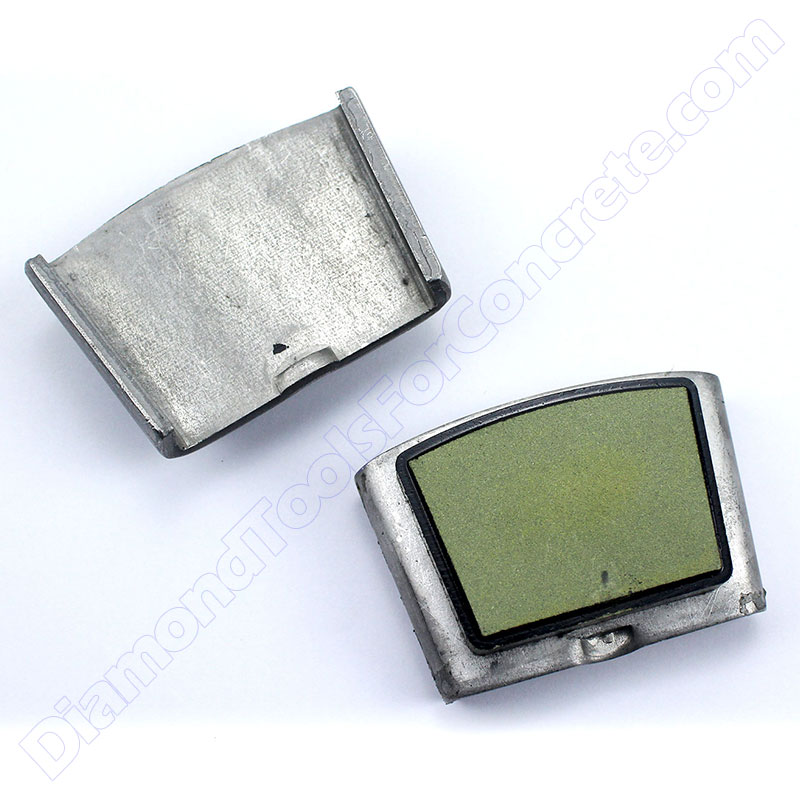
XCCP07
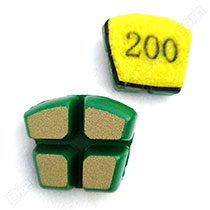
XCCP08
3-step polishing pads
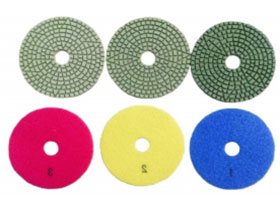
X3SP01(3 steps)
4″, 5″
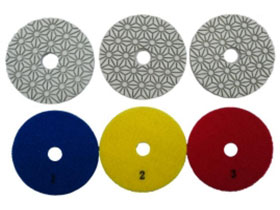
X3SP02(3 steps)
4″
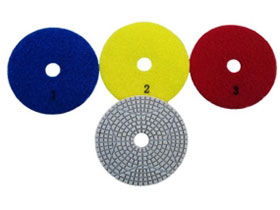
X3SP03(3 steps)
4″
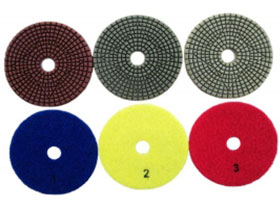
X3SP04(3 steps)
4″
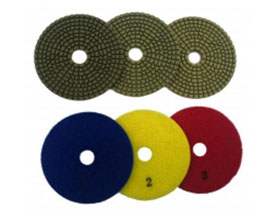
X3SP05(3 steps)
4″
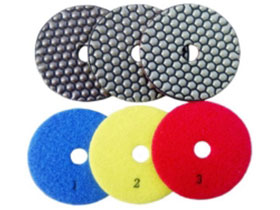
X3SP06 (3 steps, dry)
4″
5-step polishing pads
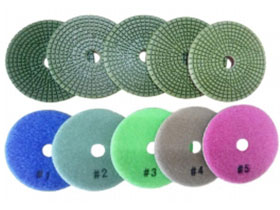
X5SP01(5 steps)
4″
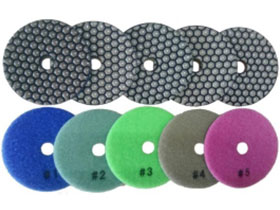
X5SP02 (3 steps, dry)
4″
Edge concrete polishing pads
Edge concrete polishing pads are specifically designed for refining and finishing the edges of concrete surfaces, which traditional polishing pads might struggle to reach. These pads are essential for achieving a uniform, high-quality finish on the edges and corners of floors, countertops, and other concrete structures. They are engineered to handle the unique challenges of edge work, such as tight spaces and irregular surfaces, ensuring that the entire concrete surface, including the edges, is polished to a consistent sheen.
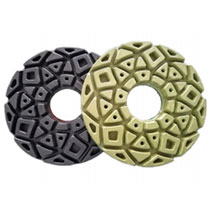
XEP01
5″
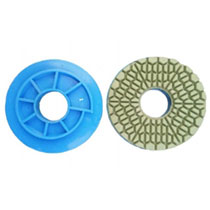
XEP02
5″
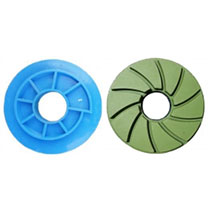
XEP03
5″
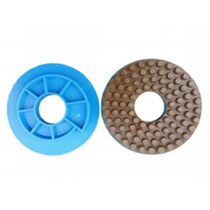
XEP04
5″
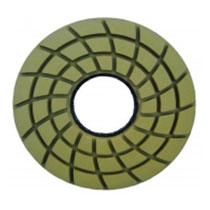
XEP05
7″
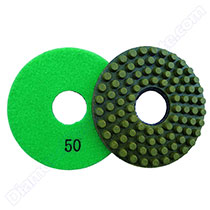
XEP06
5″
Electroplated concrete polishing pads
We offer two types of electroplated concrete polishing pads to cater to different needs: a rectangular type designed for hand use and a triangular type tailored for use with angle grinders. These tools are highly flexible, allowing you to efficiently polish the surfaces of terrazzo or concrete, especially around edges and corners. The design ensures that even the most challenging areas can be accessed and polished with ease, whether you’re using them by hand or with an angle grinder. Additionally, we supply these pads in various diamond grits, enabling you to achieve the desired finish and precision for your specific project.

Rectangle hand polishing pad
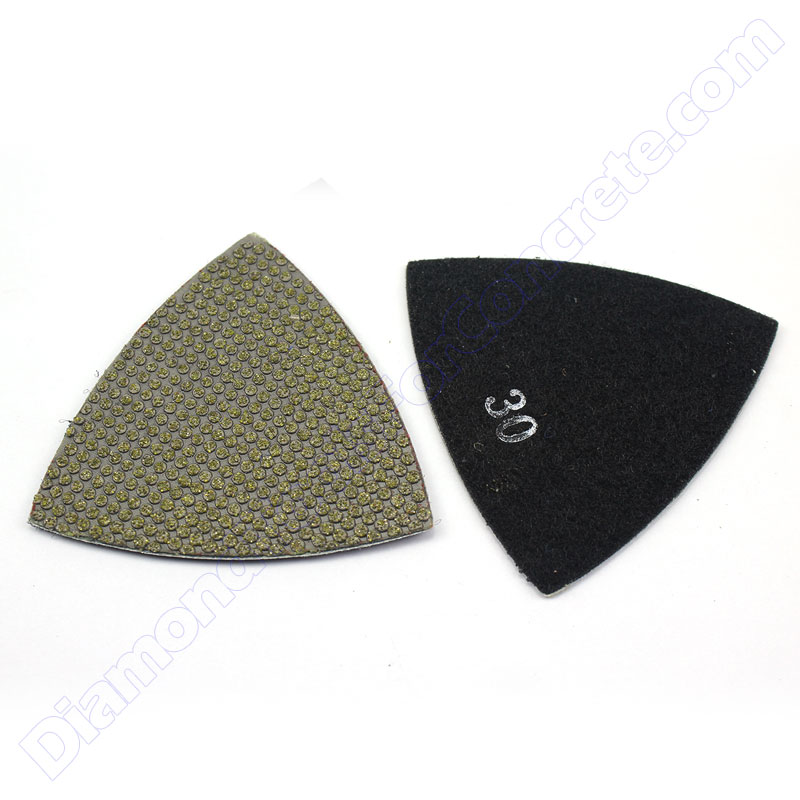
Triangle polishing pad
Sponge concrete polishing pads
Fiber sponge concrete polishing pads are durable, flexible tools designed for polishing and refining concrete surfaces, providing a smooth and even finish.
Fiber sponge pads
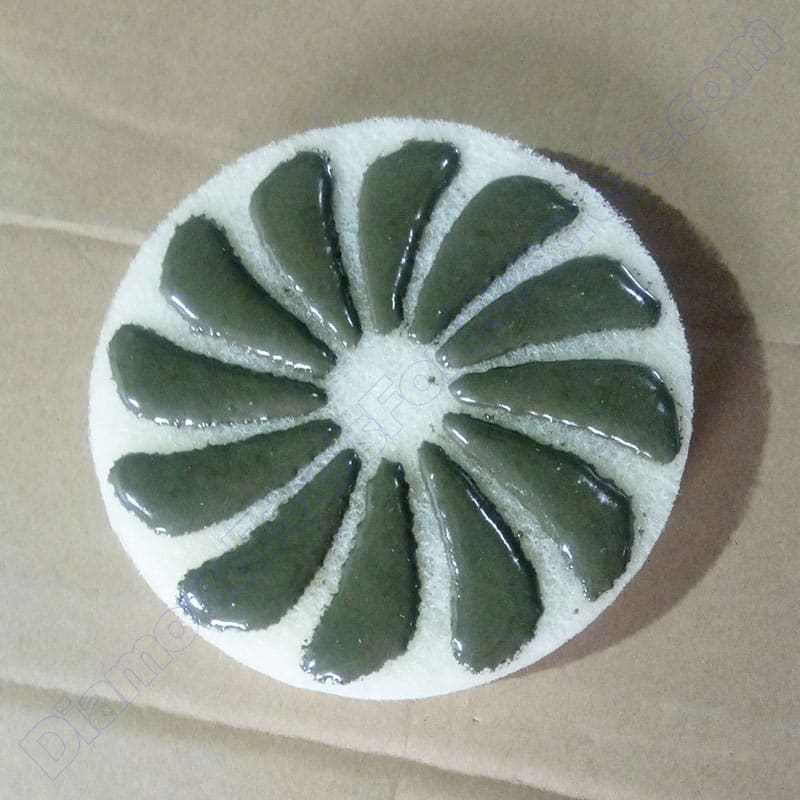
XFSP-A
4″, 5″, 7″
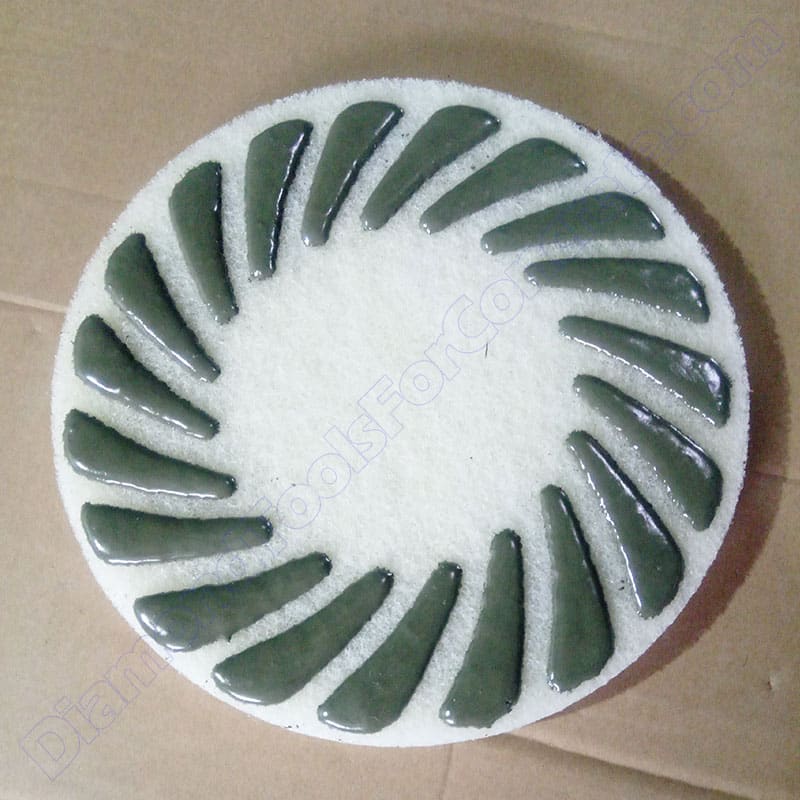
XFSP-B
9″, 11″, 13″, 17″, 20″
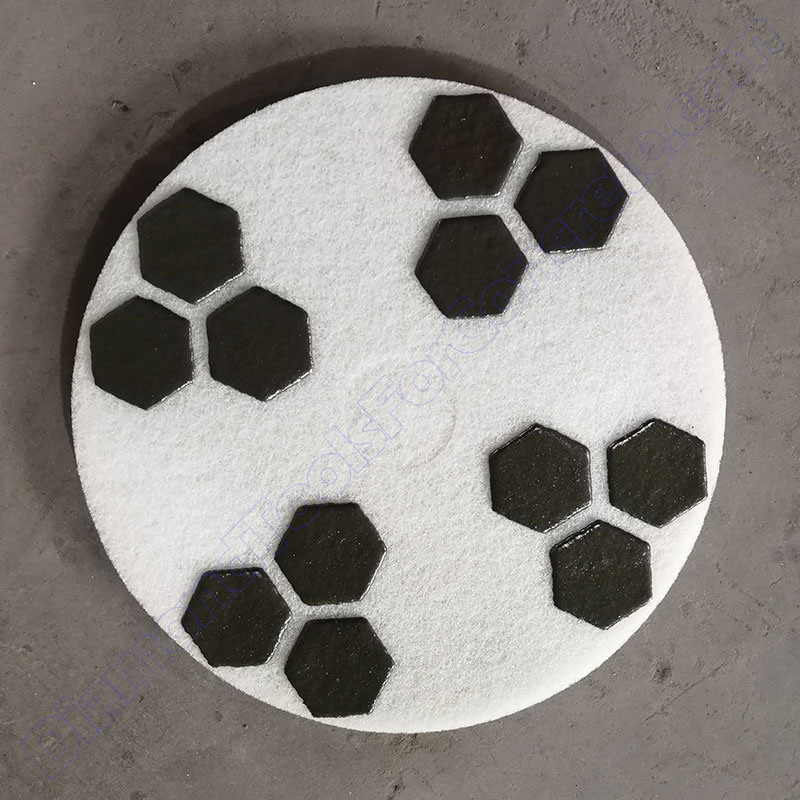
XFSP-C
20″
Animal hair sponge pads
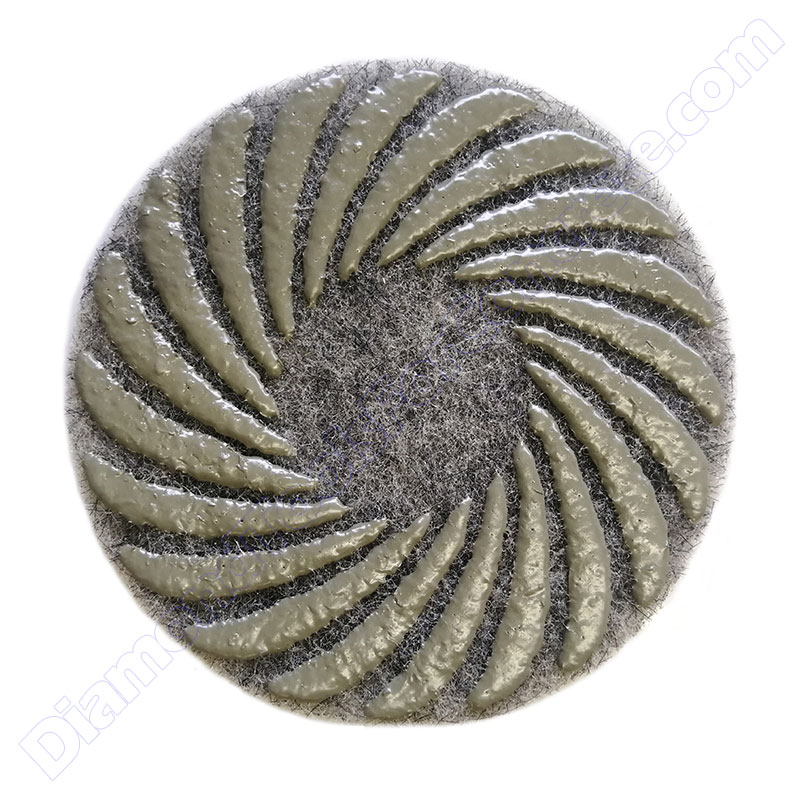
XASP-A
7″, 9″, 11″, 17″
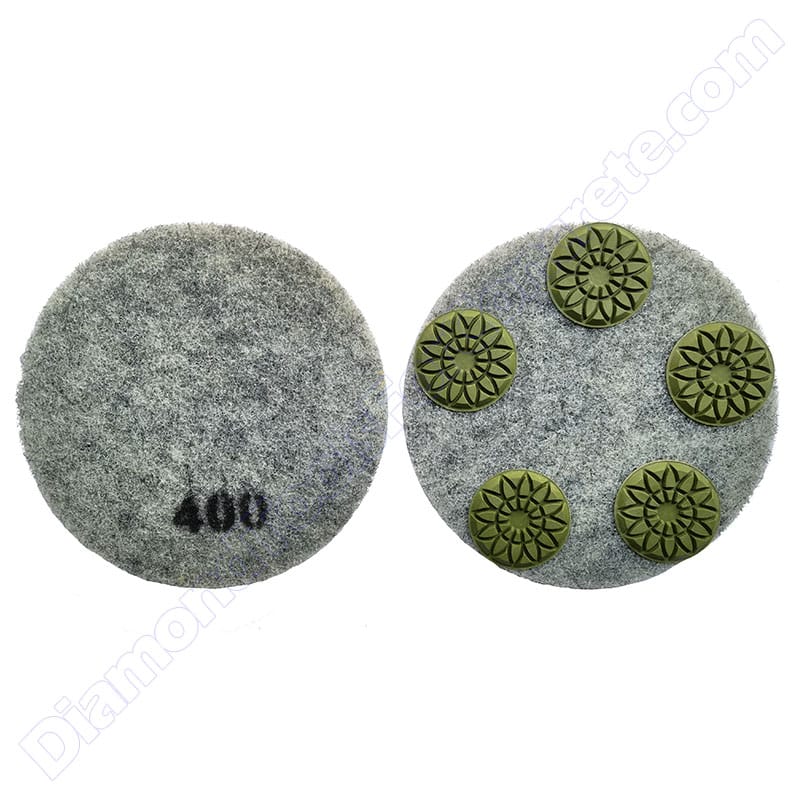
XASP-B
11″
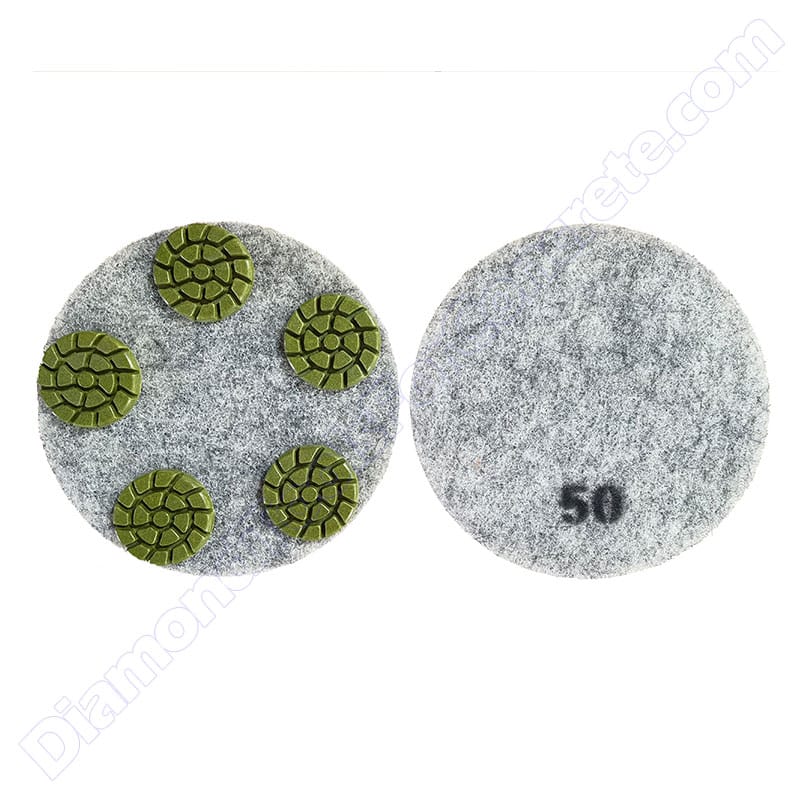
XASP-C
11″
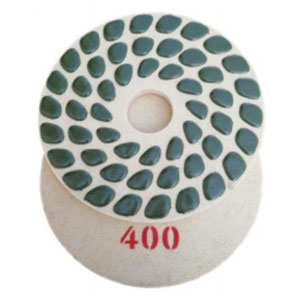
XASP-D
7″, 9″, 11″
Accessories
For concrete polishing, the main accessories are the adapters. We offer various adapters to help our customers use Velcro-type diamond polishing pads on their angle grinders, polishers, and floor grinders.
Angle grinder velcro backing pads
The following Velcro backing pads are designed for use with angle grinders, providing secure attachment for diamond polishing pads and enabling quick, easy pad changes for efficient surface finishing. We offer two types: rubber and aluminum. The rubber type is more flexible, while the aluminum type offers enhanced durability.
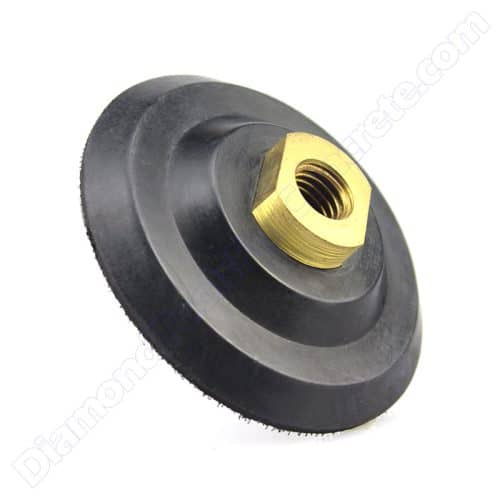
Rubber type A
RBP-A
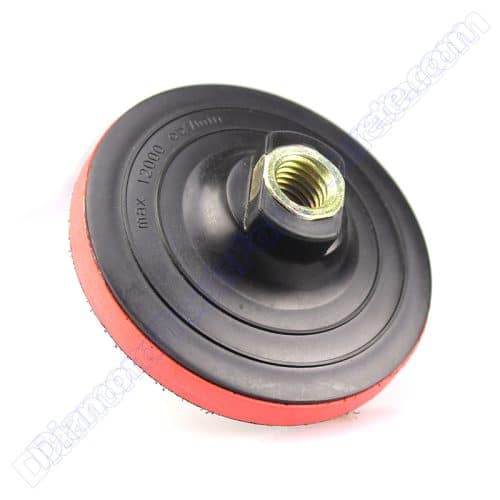
Rubber type B
RBP-B
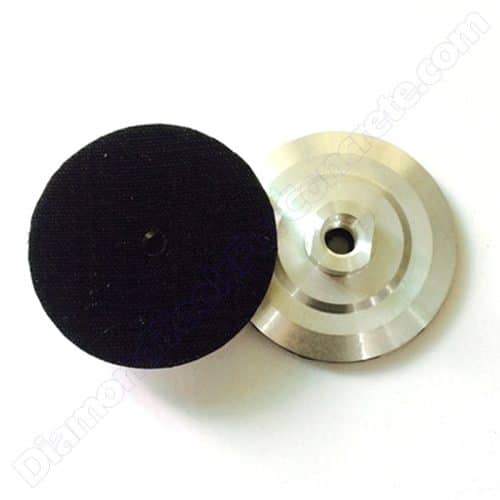
Aluminum type
ABP
Floor grinder velcro backing pads
If you need to polish floors but your grinder lacks an adapter for Velcro diamond polishing pads, you’ll need the appropriate Velcro backing pads. Below are several types we offer, compatible with various grinding machines like Husqvarna, HTC, and more. Custom types can also be made upon request.
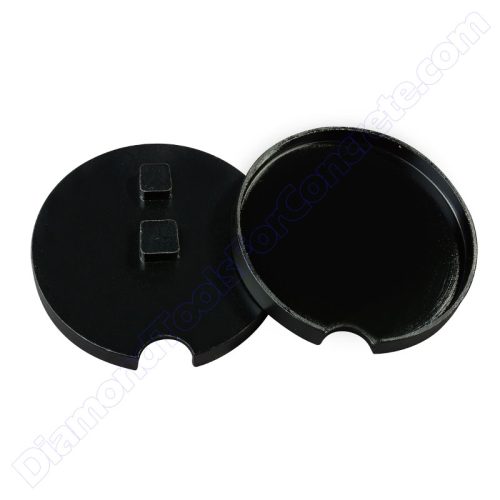
2 pins adapters
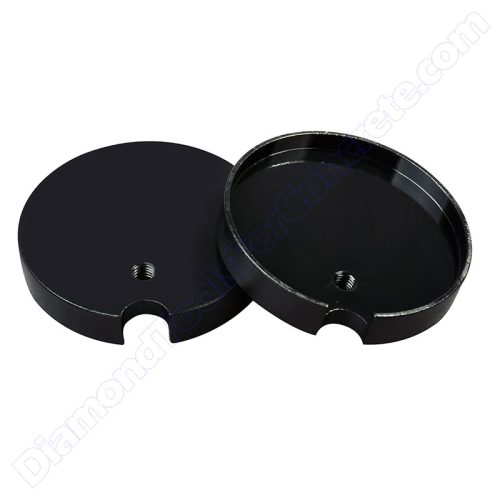
Threaded adapters
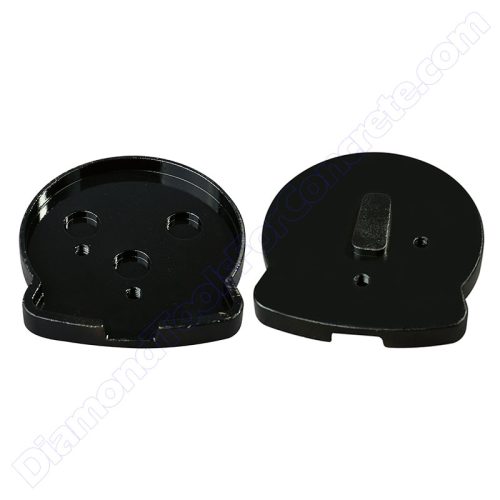
Husqvarna redi-lock adapters
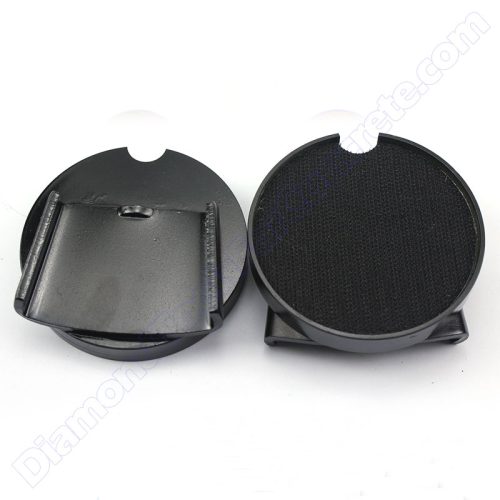
HTC adapters
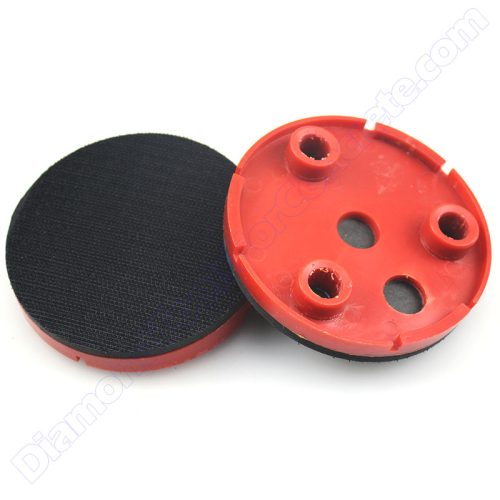
100mm Klindex velcro pads (plastic)
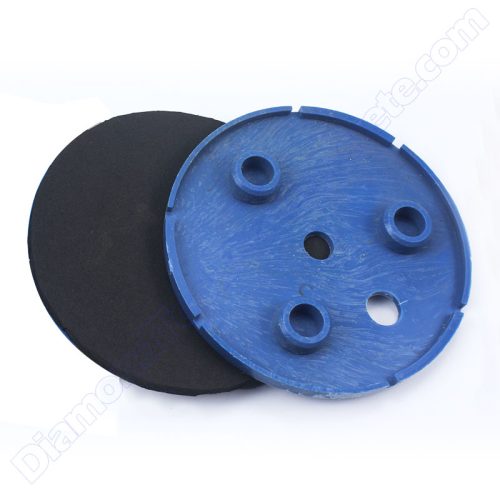
140mm Klindex velcro pads(plastic)
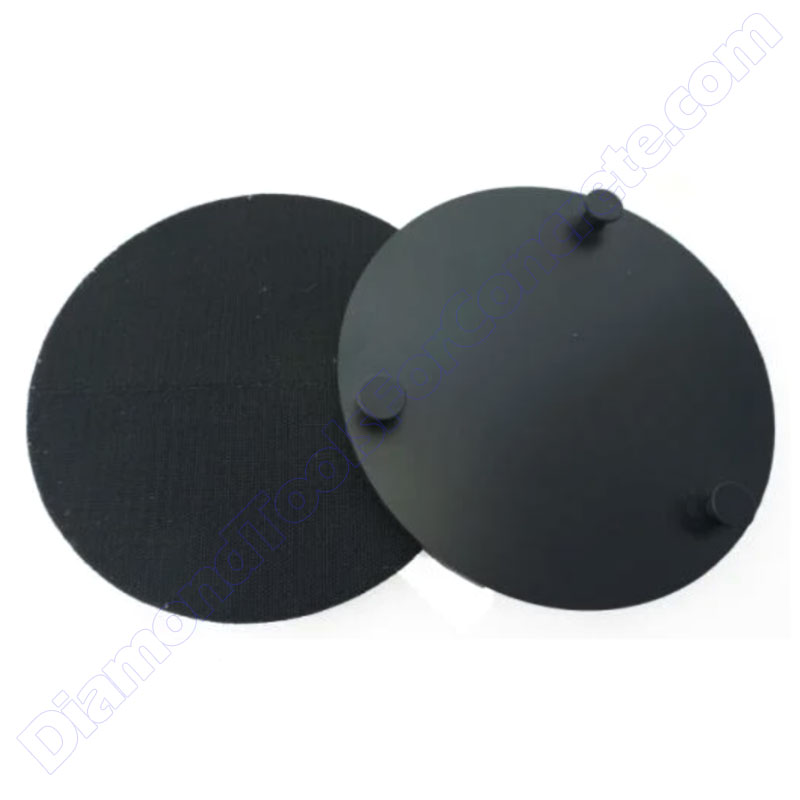
200mm Klindex velcro pads(metal)
OEM service
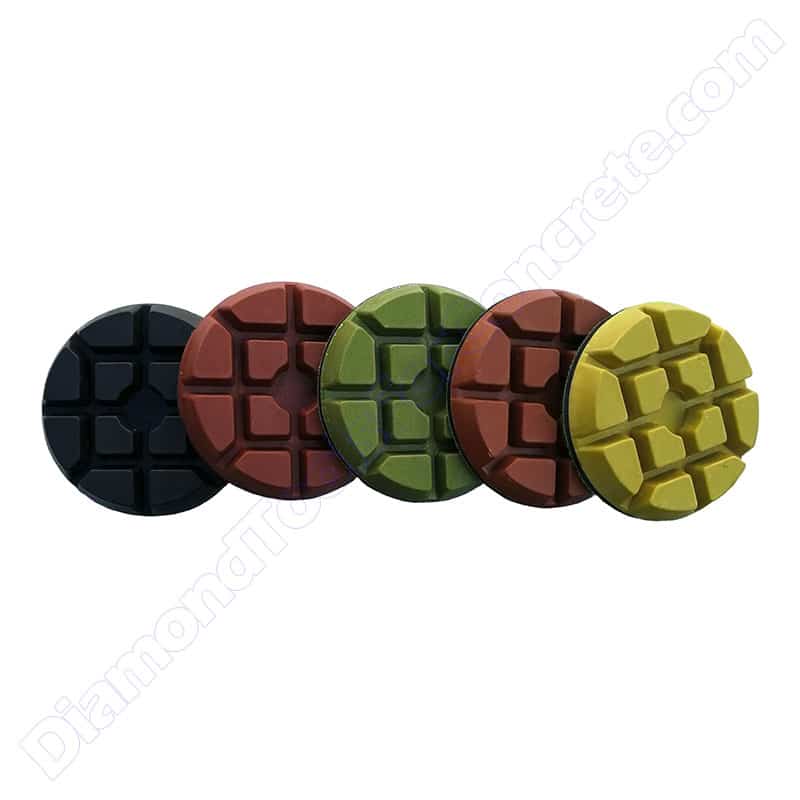
Different segment colors
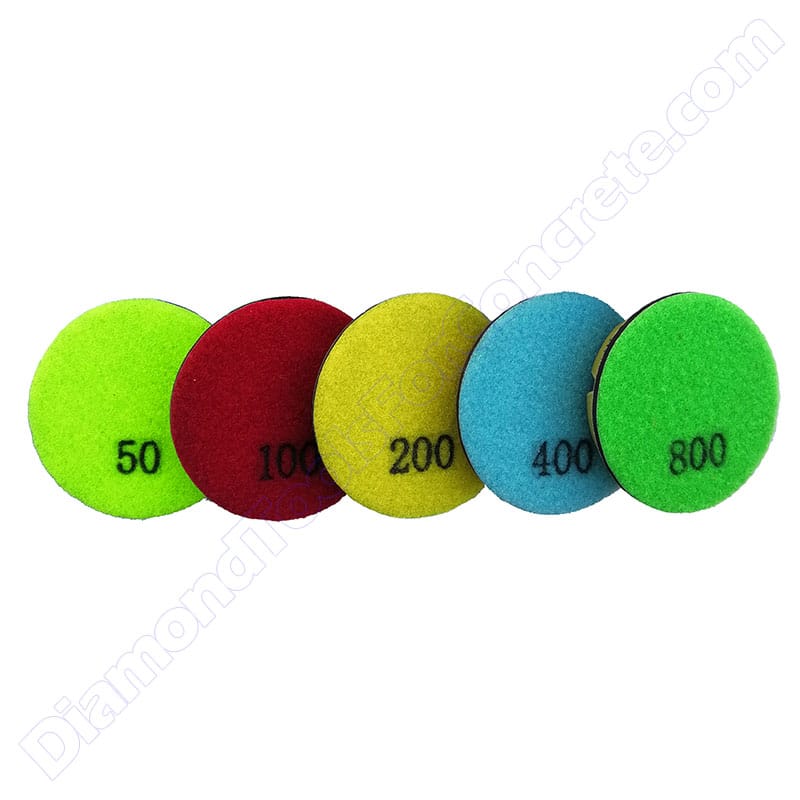
Different back loop colors
The OEM service for concrete polishing pads centers on two main features: color customization and logo printing. These options help resellers differentiate their products and strengthen their brand identity.
Color customization includes both the segment and back loop colors, allowing resellers to create a unique and recognizable look for their tools. The segment color refers to the abrasive part of the pad, while the back loop color is the attachment area, both of which can be tailored to match brand preferences.
Logo printing further enhances brand visibility by allowing resellers to display their logo directly on the polishing pads, adding a professional touch and making their products more appealing in the market.
Payment methods and terms
Regarding the payment process for concrete grinding diamonds, here are three key points:
- Currency: We accept payments in various currencies, including USD, EUR, RMB, and others.
- Payment Methods: Our supported payment methods include T/T (bank transfer) and Credit Cards.
- Payment Terms: For small orders, we require 100% payment in advance due to the relatively small amount. Splitting payments into multiple installments may incur additional bank fees. For large orders, we accept 70% payment in advance to initiate the order, with the remaining 30% balance due before shipment.
Furthermore, in support of our customers’ testing needs, we offer a 3% discount on sample (trial) orders. This discount will be reflected on the Proforma Invoice (PI).
Lead time
Lead time depends on various factors, primarily influenced by product type and order quantity. For concrete grinding diamond tools, we maintain a diverse inventory of different blank plates compatible with common floor grinding machines like HTC, Lavina, Husqvarna, Blastrac, and more. Consequently, orders for these commonly used tools can be expedited.
However, if you require customized tools or those not previously manufactured, initial production may take longer. Subsequent orders typically enjoy faster processing as we become more acquainted with your specifications.
Sample orders are typically shipped within 7-10 days. Regarding your orders, we strive for prompt delivery. But for your side, you need to plan a reasonable purchasing plan before your tools run/sell out, considering the production period and transportation time.
For urgent small orders, please contact us, and we can prioritize your tool production.
Anyway, we’ll provide an estimated lead time once your order details (including type and quantity) are confirmed.
Shipping methods
For delivery, there are five main shipping methods: Express, Air Freight, and Sea Freight are the most commonly used, while Rail and Truck are typically employed for destinations in Central Asia, Russia, Belarus, etc.
These shipping methods differ in various aspects. Let’s examine the main differences among Express, Air Freight, and Sea Freight.
| Express | Air Freight | Sea Freight | |
|---|---|---|---|
| Price | High | Medium | Low |
| Time | Fast | Medium | Slow |
| Suit Weight | Light weigh(such as the sample order) | Medium weight | Heavy weight |
| Method of Receiving Your Goods | Door-to-door | Pick up the goods yourself or Door-to-door service |
Pick up the goods yourself or Door-to-door service |
The shipping rates are tiered based on weight, with heavier shipments costing less per kilogram. If your order is close to qualifying for a lower rate by adding a bit more weight, we’ll notify you and confirm if you’d like to add more items to benefit from the better shipping rate.
Upon receipt of our proforma invoice, we will complete the shipping method, estimated transportation duration, and fees tailored to your specific order. In addition to reviewing the product items, kindly verify this section with us as well.
